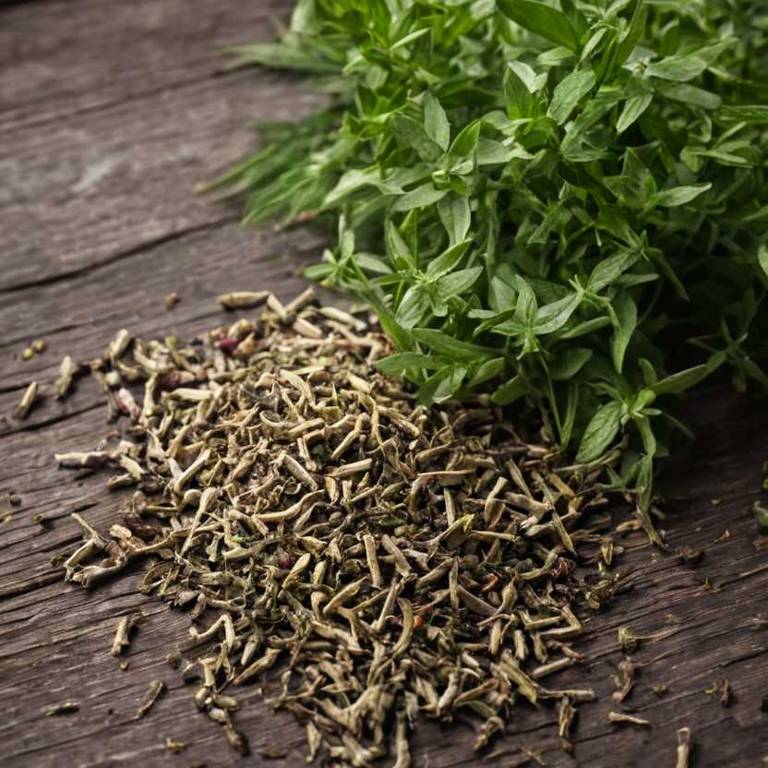By Leen Randell
Updated: Jul 06, 2024
What Are The Medicinal Properties Of Polygonum Aviculare (Knotweed)?

Polygonum aviculare, also known as knotweed, has health benefits such as reducing inflammation and promoting wound healing.
Its medicinal constituents include salicylic acid, flavonoids, and phenolic acids, which are responsible for its anti-inflammatory and antioxidant properties. The herb can be used to prepare infusions, tinctures, and ointments. Side effects of using knotweed include gastrointestinal upset and allergic reactions in some individuals.
Precautions should be taken when using knotweed, especially in large doses, as it may interact with blood thinners and other medications.
This article explains the health benefits, active constituents, medicinal preparations, possible side effects, and precautions related to Polygonum aviculare.
- What are the health benefits of Polygonum aviculare?
- What are the active constituents of Polygonum aviculare?
- What are the medicinal preparations of Polygonum aviculare?
- What are the possible side effect of using Polygonum aviculare improperly?
- What precautions to take when using Polygonum aviculare medicinally?
What are the health benefits of Polygonum aviculare?
Polygonum aviculare, also known as knotweed, has health benefits such as reducing inflammation and alleviating digestive issues.
Its antioxidant properties may help protect against cell damage and oxidative stress. Additionally, the plant is said to have antimicrobial and antifungal properties, making it a potential natural remedy for wound healing and preventing infections.
Its versatility and medicinal uses have been recognized for centuries in traditional medicine practices.
Here's a detailed article about the 10 health benefits of Polygonum aviculare.
What are the active constituents of Polygonum aviculare?
Polygonum aviculare, also known as knotweed, has active constituents such as resveratrol, a polyphenol with antioxidant and anti-inflammatory properties.
Additionally, it contains flavonoids, tannins, and phenolic acids, which may contribute to its medicinal effects.
These compounds have been shown to exhibit antimicrobial, anti-inflammatory, and antioxidant activities, suggesting potential uses in treating various health conditions, including inflammation and cardiovascular disease.
Here's a detailed article about the 10 active constituents of Polygonum aviculare.
What are the medicinal preparations of Polygonum aviculare?
Polygonum aviculare, also known as knotweed, has medicinal preparations such as infusions and decoctions made from its leaves, stems, and roots.
These preparations are traditionally used to treat various health issues, including fever, rheumatism, and skin conditions. The plant's astringent and anti-inflammatory properties are said to aid in wound healing and to reduce swelling.
Additionally, knotweed preparations are believed to have antimicrobial effects, making them a potential natural remedy for infections.
Here's a detailed article about the 10 medicinal preparations of Polygonum aviculare.
What are the possible side effect of using Polygonum aviculare improperly?
Improper use of Polygonum aviculare, also known as knotweed, increases the chances of experiencing side effects such as gastrointestinal upset, allergic reactions, and interactions with medications.
It may also cause cardiovascular issues, particularly when consumed in large quantities or combined with other herbs.
In rare cases, it may lead to kidney damage or affect blood sugar levels, making it essential to consult a healthcare professional before using knotweed.
Here's a detailed article about the 10 most common side effects of Polygonum aviculare.
What precautions to take when using Polygonum aviculare medicinally?
Before using Polygonum aviculare, also known as knotweed, for medicinal purposes, you must take precautions such as consulting with a qualified healthcare professional to determine the safe dosage and potential interactions with other medications.
Additionally, pregnant or breastfeeding women should avoid using knotweed, as it may stimulate the uterus and cause contractions.
Also, individuals with bleeding disorders or those taking anticoagulant medications should be cautious when using knotweed, as it may increase the risk of bleeding.
Here's a detailed article about 10 precautions to take when using Polygonum aviculare.